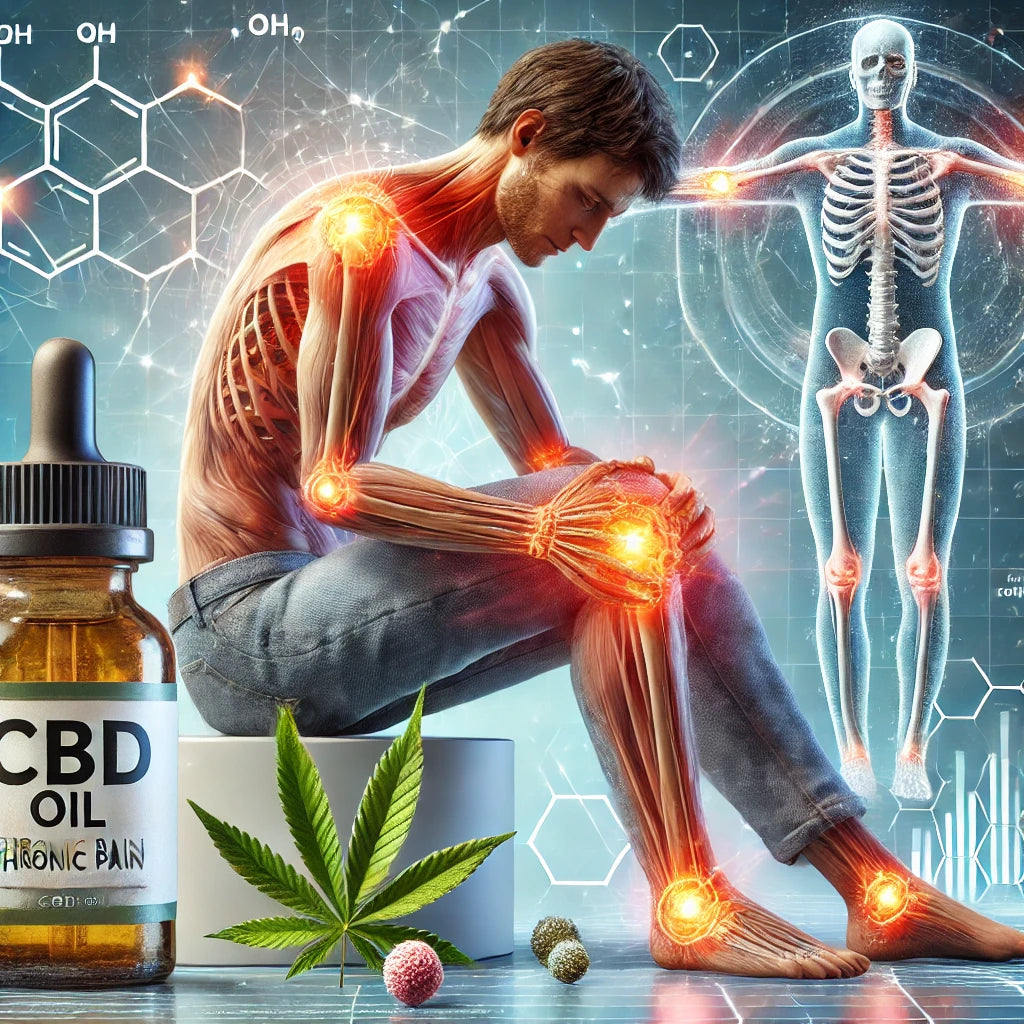
SALES FROM 01/07 TO 02/03: 20% AUTOMATICALLY DEDUCTED IN YOUR CART! FREE DELIVERY IN ALL EU, SWITZERLAND & UK FROM €70.
Navigation
Menu
How to relieve chronic pain?
Listen to this article:
In this article, we will explore CBD, its definition as well as its traditional use. We will also discuss chronic pain, its causes and how CBD can help relieve it. Next, we will look at how to optimize the daily use of CBD. Finally, we will discuss the legal prospects for its use in the EU, UK and Canada.
Coming from the Cannabis sativa plant, cannabidiol, more commonly called CBD , is one of the multiple natural elements present in this plant variety. It differs from its parent THC (tetrahydrocannabinol), which causes the psychoactive effects linked to cannabis consumption, by the absence of intoxicating effects. Its first identification dates back to 1940. Since then, a large number of studies have been carried out to evaluate its potential benefits for our health.

The action of CBD revolves around its relationship with our endocannabinoid system (ECS), a crucial aspect of our physiology which controls various vital functions such as the sensation of pain, emotional state or even sleep cycles. Cannabinoids like CBD unite with CB1 and CB2 receptors located within this system to influence their activity. However, unlike THC which binds directly to these receptors creating an intense psychoactive effect, the mode of operation of CBD is more delicate and complex. Rather, it acts indirectly on these receptors while increasing the levels of other beneficial endocannabinoids in our body. It is thanks to this unique action that CBD could help to soothe certain chronic forms of pain. Furthermore, it does not cause euphoria or dependence.
Chronic pain is defined by its persistence and resistance to traditional treatments. They generally last more than three months, considerably affecting the quality of daily life.
Several factors can be the cause of this persistent pain. Medical illnesses such as arthritis or cancer can be the instigators. Poorly treated injuries can also lead to constant suffering. Sometimes, however, there is no apparent cause to explain this stubborn pain.
Many people with this condition report a noticeable decline in overall well-being and mental deterioration due to the ongoing frustration of dealing with endless discomfort.
This is where we discover the potential of CBD (cannabidiol). In the following paragraphs, we will explore how this non-psychoactive component of cannabis can effectively alleviate the symptoms of individuals dealing with chronic pain without the harmful side effects of medications usually prescribed to treat this situation.
Since ancient times, marijuana has served as a traditional medicine . Indigenous people used it to cure various illnesses including chronic pain. Modern cannabis differs from that used by our ancestors but retains its active components with potential therapeutic effects.

A 2016 Journal of Pain article highlights the analgesic effects of CBD in patients with persistent pain. This compound appears to reduce inflammation and inhibit the transmission of pain signals to the brain.
The ancestral medical use of this plant sheds light on its possible benefits:
It is clear that CBD has significant medical potential. However, it should be remembered that this is a relatively new area requiring more research.
Various clinical studies have highlighted the benefits of Cannabidiol (CBD) on persistent pain. One such investigation, published in the Journal of Experimental Medicine, revealed that individuals treated with CBD showed a significant reduction in painful sensations. The findings indicate curative potential to relieve pain and inflammation without causing addiction or pronounced side effects.
In parallel with scientific research, we have gathered several positive feedback from users confirming the effectiveness of CBD in the treatment of persistent pain. These people notice a marked improvement in their quality of life thanks to CBD, notably highlighting a notable reduction in suffering and more restful sleep.
It is crucial to adopt the right dosage to effectively alleviate chronic pain with CBD. As each person is unique, the amount needed may fluctuate. We therefore recommend that you start with a small dose and gradually increase until you reach the level that corresponds to your body and your symptoms.
To maximize the daily use of CBD, several practical tips exist. First, choose a form of consumption that suits your lifestyle: sublingual oil, capsules or even topical cream can be considered depending on your tastes. Then, don't be afraid to administer your dose regularly throughout the day rather than all at once in order to maintain a stable level in the body.

In terms of legislation, the EU has recently recognized CBD as a safe product to consume. However, each country has its own regulations; it is essential to be informed before purchasing.
In the United Kingdom, the legality of CBD depends on its THC content, which must not exceed 0.2%. In Canada, the situation is more permissive: the law has authorized all forms of cannabis since 2018.
These advances offer a new perspective for those looking for natural solutions to soothe their chronic pain and improve their daily lives.
Submit your email to get updates on products and special promotions.